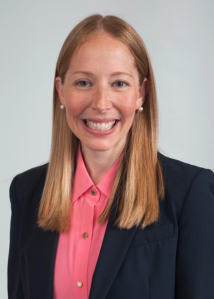A Breath of Hope Lung Foundation (ABOH)
Scientific Advisory Committee
A Breath of Hope Lung Foundation (ABOH) has invested over $2.5 million in U.S. lung cancer research projects over the past ten years. ABOH is committed to being a key contributor to the science that will lead to lower mortality rates, and as such, has added a national expert committee to help us vet our applications.
The Scientific Advisory Committee began operating in early 2020.
Mary Jo Fidler, MD
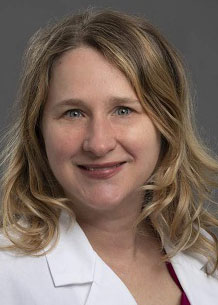 Dr. Fidler is an associate professor of medicine at Rush University Medical Center in the Division of Hematology, Oncology and Cell Therapy.
Dr. Fidler is an associate professor of medicine at Rush University Medical Center in the Division of Hematology, Oncology and Cell Therapy.
Dr. Fidler attended Cornell University in Ithaca, New York for undergraduate work. She received her medical degree from the Albert Einstein College of Medicine in Bronx , New York and then went on to complete her internal medicine residency at the McGaw Medical Center of Northwestern University in Chicago and Fellowship in Hematology/Oncology at Rush University Medical Center.
Dr. Fidler specializes in the treatment of thoracic and head and neck cancers. Her translational research interests focus on mechanisms of chemotherapy and radiotherapy resistance, predictors of response to immune check point inhibitors, and cancer cachexia. She has enrolled patients on several clinical trials testing both immune checkpoint inhibitors and targeted therapies. Dr. Fidler has authored and co-authored several manuscripts, publications and abstracts.
She has served on the Boards of Trustees for the Chicago Medical Society and the Illinois State Medical Society and has chaired various advocacy groups through these organizations.
Apar Kishor Ganti, MD, MS
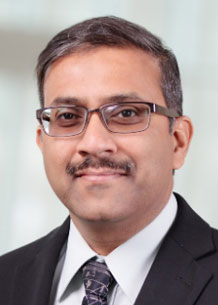 Dr. Ganti is actively engaged in medical practice, teaching and clinical research and specializes in the care of patients with head and neck, including thyroid, and lung cancer at the Omaha VA Medical Center and the University of Nebraska Medical Center. He is also a member of the Respiratory Committee of the Alliance for Clinical Trials In Oncology and the Chair of the Small Cell Lung Cancer Committee of the National Comprehensive Cancer Network. Dr. Ganti is a member of the VA Precision Oncology Program Advisory Committee and the VA Clinical Science Research & Development Centralized Data Monitoring Committee.
Dr. Ganti is actively engaged in medical practice, teaching and clinical research and specializes in the care of patients with head and neck, including thyroid, and lung cancer at the Omaha VA Medical Center and the University of Nebraska Medical Center. He is also a member of the Respiratory Committee of the Alliance for Clinical Trials In Oncology and the Chair of the Small Cell Lung Cancer Committee of the National Comprehensive Cancer Network. Dr. Ganti is a member of the VA Precision Oncology Program Advisory Committee and the VA Clinical Science Research & Development Centralized Data Monitoring Committee.
His research interests are focused on development of clinical trials evaluating newer treatment approaches for patients who are not candidates for standard therapies. His laboratory is also focused on evaluating new pathways in head and neck and lung cancer and identifying novel prognostic and predictive biomarkers for these malignancies.
Shirish Gadgeel, MD
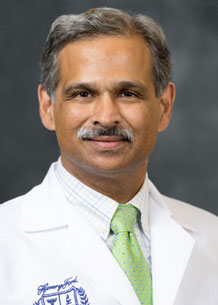 Dr. Shirish Gadgeel, is the Chief of Division of Hematology and Oncology and Associate Director of Patient Experience and Clinical Care at Henry Ford Cancer Institute/Henry Ford Hospital, Detroit, Michigan. He is also a Professor at Wayne State University. He is a medical oncologist by training whose area of interest is lung cancer research and, more specifically, drug development in lung cancer. He has conducted and participated in many lung cancer–specific trials, and in phase I trials, including investigator-initiated trials based on laboratory research. Dr Gadgeel has also been a principal investigator (PI) of a Southwest Oncology Group trial, S0528. Currently, he is a PI of several trials, including national PI of S1507. He has also engaged in many epidemiologic studies in the field of lung cancer, publishing on features of lung cancer in African Americans and young patients. He has served as a PI of multi-PI R21 to identify ‘driver’ genetic alterations in African American patients with lung cancer.
Dr. Shirish Gadgeel, is the Chief of Division of Hematology and Oncology and Associate Director of Patient Experience and Clinical Care at Henry Ford Cancer Institute/Henry Ford Hospital, Detroit, Michigan. He is also a Professor at Wayne State University. He is a medical oncologist by training whose area of interest is lung cancer research and, more specifically, drug development in lung cancer. He has conducted and participated in many lung cancer–specific trials, and in phase I trials, including investigator-initiated trials based on laboratory research. Dr Gadgeel has also been a principal investigator (PI) of a Southwest Oncology Group trial, S0528. Currently, he is a PI of several trials, including national PI of S1507. He has also engaged in many epidemiologic studies in the field of lung cancer, publishing on features of lung cancer in African Americans and young patients. He has served as a PI of multi-PI R21 to identify ‘driver’ genetic alterations in African American patients with lung cancer.
Dr. Gadgeel served as the co-leader of the Molecular Therapeutics Research Program of the Core Cancer Center Grant of Karmanos Cancer Institute in Detroit before joining the University of Michigan. He was also the site PI for the NO1 grant, awarded to the California Cancer Consortium. Since 2017 he served as co-leader of the Thoracic Oncology Research Program as well as the Mary Lou Kennedy Research Professor of Thoracic Oncology at the University of Michigan in Ann Arbor. His clinical research experience spans 20 years. He is also a member of the steering committee of the Lung Cancer Committee of Southwest Oncology Group. He is a member of the editorial board of Clinical Lung Cancer and a reviewer for many journals, including Clinical Cancer Research, Journal of Clinical Oncology, Lancet Oncology, and Journal of Thoracic Oncology. He has served as faculty for the annual meeting of the American Society of Clinical Oncology (ASCO) and as a member of the education committee of ASCO. He is a member of the Communications committee of the International Association of Study of Lung Cancer (IASLC). He was awarded by the National Cancer Institute the Cancer Clinical Investigator Team Leadership Award in 2012.
Ramaswamy Govindan, MD
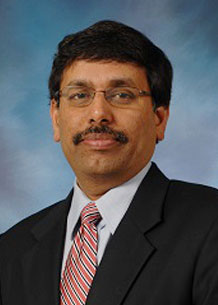 As a medical oncologist interested in thoracic malignancies, Dr. Govindan has led a number of institutional and multi-center phase II and III studies in lung cancer over the past decade.
As a medical oncologist interested in thoracic malignancies, Dr. Govindan has led a number of institutional and multi-center phase II and III studies in lung cancer over the past decade.
Working with The McDonnell Genome Institute at the Washington University School of Medicine and with The Cancer Genome Atlas (TCGA) project (as a co-chair) sponsored by the NCI, he is actively involved in sequencing the whole genomes and exomes of several hundred patients with lung cancer.
Dr. Govindan is also leading the efforts to move personalized therapies in early stage and locally advanced lung cancer. Dr. Govindan is the Principal Investigator for the NCI funded ALCHEMIST trial to study the role of erlotinib in patients with early stage EGFR mutated lung cancer and the Principal Investigator of an NCI sponsored multicenter trial to evaluate the role of targeted agents in locally advanced non-small cell lung cancer.
Dr. Govindan is also the principal investigator for the NCI funded R25 STRENGTH program to train senior fellows and junior faculty members in patient oriented cancer research and is the Program Director of the Washington University Paul Calabresi K12 Oncology training program funded by the National Cancer Institute.
He is keen on translating genomic discoveries from the laboratory setting to clinical setting to improve the outcomes of patients with lung cancer.
Aaron Lisberg, MD
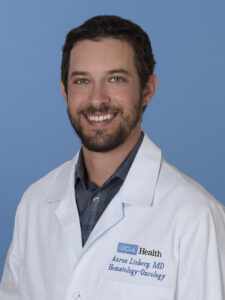
Aaron Lisberg, MD, is a thoracic medical oncologist at the University of California, Los Angeles (UCLA). He specializes in novel drug development, antibody-drug conjugates (ADCs), immunotherapy, and metabolically targeted therapies in patients with advanced malignancies with a focus on lung cancer. He is board-certified in hematology and medical oncology.
Dr. Lisberg received his medical degree from the University of Minnesota Medical School, where he was elected to the AOA honor society. He then completed his internal medicine residency at The University of Washington in Seattle and his hematology/oncology fellowship at UCLA.
Dr. Lisberg conducts translational research on novel therapeutic approaches in advanced malignancies, specifically focusing on lung cancer. He has a wide range of ongoing research projects, including the evaluation of factors predictive of response or toxicity to antibody-drug conjugates (ADCs) and immune checkpoint inhibitors, pre-clinical/clinical evaluation of novel metabolic therapies, and assessment of effective treatments in patients with targetable tumor alterations. He is also the clinical PI and Sub-I of several clinical trials evaluating novel therapeutics in various malignancies, including Phase I, II, and III assessments. View Dr. Lisberg’s publications!
Aaron S. Mansfield, MD
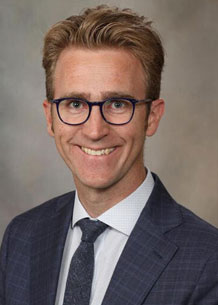
Aaron S. Mansfield, MD is a medical oncologist with a focus on thoracic malignancies and tumor immunology. His clinical focus includes: Non-small cell lung cancer, Small cell lung cancer, Mesothelioma, Thymic malignancies, Coordinating multi-disciplinary care for patients with thoracic malignancies, Promoting patient and care-giver understanding of the diagnosis and treatment options, and Biomarker screening to improve patient selection for early phase clinical trials
In addition to his clinical activities Dr. Mansfield is active in research and education. He publishes in many journals and often speaks at national and international meetings. We are thrilled to have Dr. Mansfield’s expertise on our Advisory Committee.
John Nitiss, PhD
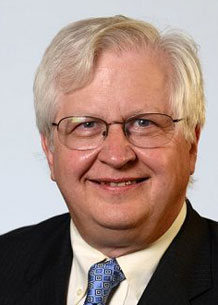 Dr. John Nitiss received his PhD degree in Biology from the Illinois Institute of Technology, where he specialized in the genetics and biochemistry of DNA metabolism. He joined the laboratory of Dr. James C Wang, at Harvard University where he carried out studies that demonstrated how drugs that target DNA topoisomerases exert their anti-cancer effects. Topoisomerases are an important class of enzymes that are targeted by anti-cancer drugs such as etoposide, doxorubicin, and irinotecan. Understanding the workings of these enzymes and the drugs that target them is important for achieving optimal patient outcomes with current topoisomerase-targeting drugs and developing the next generation of these anti-cancer drugs.
Dr. John Nitiss received his PhD degree in Biology from the Illinois Institute of Technology, where he specialized in the genetics and biochemistry of DNA metabolism. He joined the laboratory of Dr. James C Wang, at Harvard University where he carried out studies that demonstrated how drugs that target DNA topoisomerases exert their anti-cancer effects. Topoisomerases are an important class of enzymes that are targeted by anti-cancer drugs such as etoposide, doxorubicin, and irinotecan. Understanding the workings of these enzymes and the drugs that target them is important for achieving optimal patient outcomes with current topoisomerase-targeting drugs and developing the next generation of these anti-cancer drugs.
Dr. Nitiss has held faculty positions at the University of Southern California School of Medicine and the internationally renowned pediatric research institution, St. Jude Children’s Research Hospital, in Memphis, TN. In 2011, Dr. Nitiss joined the faculty of the University of Illinois, Chicago where he is a Professor of Pharmacology, Assistant Dean for Research for the UIC College of Pharmacy, and Associate Head for Research of the Pharmaceutical Sciences Department.
Research in the Nitiss lab continues to focus on topoisomerases as targets for cancer chemotherapy, targeting DNA repair with cancer therapeutics, and mechanisms of repairing DNA damage. He has a long record of support from the National Cancer Institute, and in 2018, was named a fellow of the American Association for the Advancement of Science.
Luis Raez, MD, FACP, FCCP
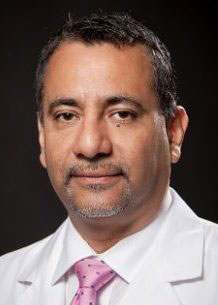 Luis E. Raez, MD, FACP, FCCP; is the President of the Florida Society of Clinical Oncology (FLASCO). He works as Chief of Hematology/Oncology & Medical Director of Memorial Cancer Institute (MCI), he is also Director of the Thoracic Oncology Program. He is CO-Director of the MCI/FAU Florida Cancer Center of Excellence. He is also Clinical Professor of Medicine at Florida International University (FIU) and Visiting Professor of Medicine at Cayetano Heredia University in Peru. He is also an Affiliate Associate Professor of Clinical Biomedical Science for Florida Atlantic University (FAU).
Luis E. Raez, MD, FACP, FCCP; is the President of the Florida Society of Clinical Oncology (FLASCO). He works as Chief of Hematology/Oncology & Medical Director of Memorial Cancer Institute (MCI), he is also Director of the Thoracic Oncology Program. He is CO-Director of the MCI/FAU Florida Cancer Center of Excellence. He is also Clinical Professor of Medicine at Florida International University (FIU) and Visiting Professor of Medicine at Cayetano Heredia University in Peru. He is also an Affiliate Associate Professor of Clinical Biomedical Science for Florida Atlantic University (FAU).
He was an Associate Professor of Medicine, Epidemiology and Public Health, and a Co-Director of Thoracic Oncology at Sylvester Cancer Center/University of Miami for 10 years (2001-2011). He has expertise in medical oncology in the areas of lung cancer, and head and neck cancer.
He designs phase I-III clinical trials with new chemotherapeutic agents and combinations. Dr. Raez does translational research and clinical research. He has been funded by NCI and the pharma industry. He has given oral presentations and lectures in national and international meetings in the US, Europe, Latin-America, Africa and Asia.
He has been the Chairman of the IASLC Latin American Group (LATAM) since 2018; Chair of the IASLC Membership Committee from 2015-2018; International Chair of the IASLC-Latin-American Meeting (LALCA) since 2014; Chairman for the “Miami Best of ASCO” since 2014, Chair and Founder of the “Miami Cancer Meeting (MCM)” since 2002, Co-Chairman at the “Puerto Rico Fall Cancer Symposia (FCS)” since 2010. He is one of the founder members of Oncology Latin-American Association (OLA).
Dr. Raez research publications include:
- Rosas D, Raez LE, Russo A, Rolfo C. Neuregulin 1 Gene (NRG1). A Potentially New Targetable Alteration for the Treatment of Lung Cancer. Cancers (Basel). 2021 Oct 9;13(20):5038. doi: 10.3390/cancers13205038. PMID: 34680187; PMCID: PMC8534274.
- Malapelle U, Pisapia P, Addeo A, Arrieta O, Bellosillo B, Cardona AF, Cristofanilli M, De Miguel-Perez D, Denninghoff V, Durán I, Jantus-Lewintre E, Nuzzo PV, O’Byrne K, Pauwels P, Pickering EM, Raez LE, Russo A, Serrano MJ, Gandara DR, Troncone G, Rolfo C. Liquid biopsy from research to clinical practice: focus on non-small cell lung cancer. Expert Rev Mol Diagn. 2021 Nov;21(11):1165-1178. doi: 10.1080/14737159.2021.1985468. Epub 2021 Oct 11. PMID: 34570988.
- Gabay C, Russo A, Raez LE, Rolfo Cervetto C. Adjuvant therapy in non-small cell lung cancer: is targeted therapy joining the standard of care? Expert Rev Anticancer Ther. 2021 Nov;21(11):1229-1235. doi: 10.1080/14737140.2021.1982387. Epub 2021 Sep 25. PMID: 34528869.
He is American Board Certified in: Internal Medicine and Medical Oncology. He is board eligible in Hematology.
He is a member and serves in several committees at: AACR, OLA, ESMO, ASCO, IASLC, ALLIANCE, NCCTG, ACCP, ACP, ACSG, SLACOM, FLASCO among other institutions.
Jaime Laurel Schneider, M.D. Ph.D.
